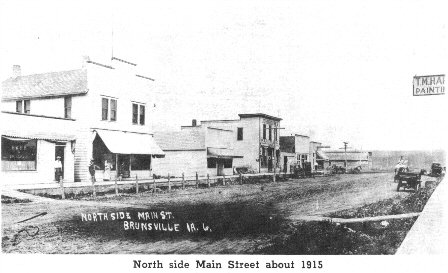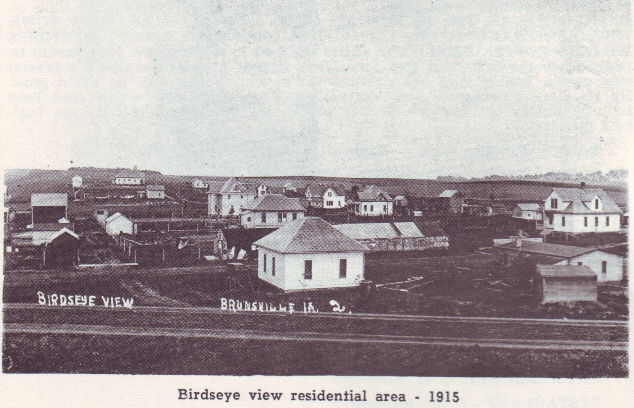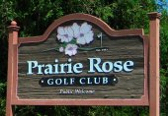Golden Jubillee Booklet - Chapter I - Birth of a Town
pages 4 - 5

Fifty years is really not such a long time when compared to the thousands of years that man has been on this old earth. Still, in the past fifty years, we have seen a social, economic and scientific revolution such as the world has never known. Back in 1911, when Brunsville was a mere infant, the automobile was still called the horseless carriage. Very few people had even heard of an airplane. When someone spoke of the atom, we very politely thought he had mispronounced and meant Adam.
Brunsville was a boom town in every sense of the word. The Hawarden-Merrill cut-off of the Chicago N.W. Railroad was built during 1909. A number of business buildings were built in 1910 as can be ascertained from the titles on an article from the Feb. 15, 1910 issue of the Le Mars Sentinel. "NEW TOWN WILL HAVE BANK" "Active Operations At Brunsville In Spring" — "STORES WILL BE MOVED THERE." The article went on to say that the town would be ready when the first train goes thru. That a bank, a hardware store, a general store and a lumber yard are already assured, and the list will no doubt grow. By 1911, many residences and practically the whole business district had been built.
A history of Plymouth County written in 1916 listed the following business directory:
BANKS: Farmers Bank — Bank of Brunsville
BLACKSMITHS: — Fred Toel — George Benton
CREAMERY:—Plymouth Creamery Co., Jobe Kennedy Manager
ELEVATORS:—Farmers Elevator Co., Frank Hoese Elevator
GENERAL DEALERS:—Edward Johnson, John Hauschildt
HARDWARE AND HARNESS:—John F. Dirks
IMPLEMENTS:—George E. Pew
LUMBER DEALER:—Brunsville Lumber Co., George Popken, Manager
MEAT MARKET:—Nate Gearke
PHYSICIAN:—Dr. C. G. Ellsworth
RESTAURANT:—C. M. Richards
The primary purpose of the town has always been to serve the friends and neighbors in the surrounding community. This was clearly evident even in the early days when steps were taken to establish a creamery, which was quickly to become the villages chief industry. The creamery was organized and owned by the farmers of the community and was started in the spring of 1915. Jobe Kennedy was selected to be secretary and first manager of the company. The first board of directors included the following men: H Meinen, president; J. Miller, vice president; Carl Ahrendt, D. H. Kruse and H. A. Ludwigs, members of the board. Considering the times, the company did a good business. Here are a few statistics: from May 22, 1915 to Dec. 31, 1915, 231,02 pounds of cream were received and manufactured into 78,111 pounds of butter, for which the farmers received a total of $20,390. At the end of the first year of operation, the creamery had about 150 patrons.
Those early day councilmen were at the same time progressive and conservative. It is hard to say whether they were Republican, Democrat or Prohibition, but the latter is doubtful. In 1917 the council decided to build a town hall, so that they would have a suitable place to meet. Low bid for materials was $360.00 and for labor $129.00 or a total of $489.00. Late the next year a resolution was passed to stop all dances for six months from date. And also Matt Klein is to close his pool hall every night by 11 P.M., no pool playing or cards on Sunday,
no gambling at any time. If he violated this resolution, his place is to be closed.
In any discussion of persons who served the municipal enterprise, it would be an oversight not to mention T. M. Harms, who served as mayor from 1935 through 1944. "T. M." as we all knew him, was a Brunsville booster from the start. It was to his credit that the city park was planted to trees. Also during his term, a fund was started which eventually resulted in the town water system. Improvements were made on sidewalks and streets as was the fire fighting equipment. There were occasions when his ideas seemed out of tune with the times, but you could always be sure they were intended to boost his town.

*Click on any of the pictures to enlarge.
